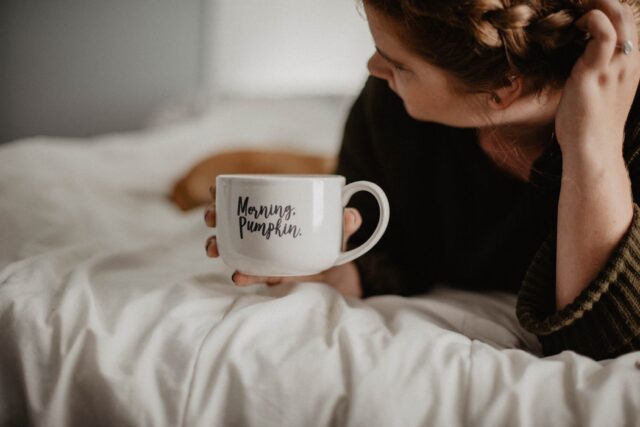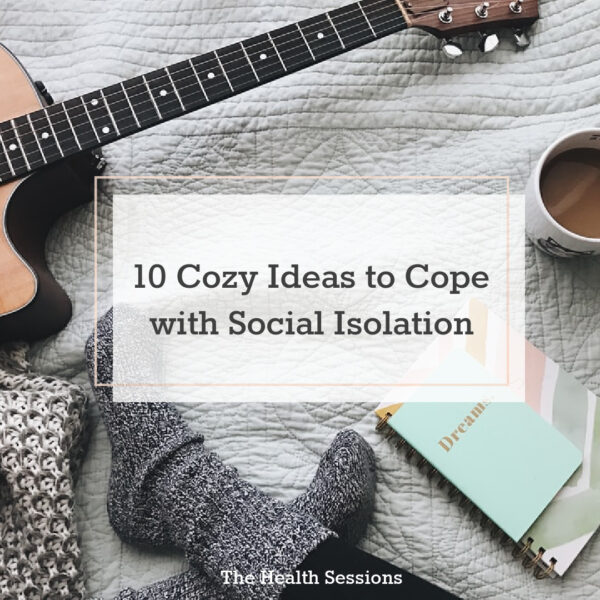How to Relieve Pain Naturally

When you’re living with chronic illness, you’re probably no stranger to social isolation. Lasting health problems often force us to limit our work and social life, and spend a lot of time at home instead.
But this year is different, even for us. Inviting people over may be restricted, or a risk you’re not willing to take. And going outside can be even more challenging than before.
So what can you do to get through this period of social isolation? Obviously, a lot depends on your living situation, if you have housemates and your health condition. But here are some ideas to get cozy at home this Fall and Winter.
This blog post contains some affiliate links to resources you may find helpful, at no extra costs to you. All opinions are my own.
Connecting with the people we love is vital for our wellbeing. That’s why Web MD advises us: don’t practice ‘social distancing’, but ‘distant socializing’.
By now, FaceTime and Zoom calls are probably already part of your routine. But don’t forget that little jolt of excitement you get from snail mail through the mailbox. Write an old-fashioned letter to your (grand)parents or send your best friend a cute card. If you don’t know what to say, Emily McDowells amazing cards have got you covered.
If you miss hanging out together, you could also try playing chess online, doing a virtual pub quiz, joining a book club or having a social distance dinner party. It’s not the same as talking face-to-face, but the virtual company will brighten your mood.
Do you feel like you’ve got no one to reach out to? Take a look at these 7 ways to make new friends when you have chronic illness or call your national hotline for support.

I’ve said it before: entertaining yourself when you’re sick at home is not a luxury. Positive distractions can actually help you to take your mind off pain, reduce stress and cultivate positive emotions (which you need to stay resilient).
But the fun of binge-watching your favorite series wears off after a while. And you know that endless video gaming, online shopping sprees and drowning your sorrows with ice cream will only hurt you in the long run.
So experiment with new, spoonie-proof activities you can do at home. Get that giant jigsaw puzzle out of the attic, learn a new language, take up photography or knit a rustic scarf. The Creative Home Projects Bundle contains over 64 tutorials and templates to help you get started with hand lettering, art journaling, upcycling your wardrobe and easy home deco. It’s only available for 5 days, so grab your chance now to beat the boredom for good.
With their cold and dark winters, Scandinavian countries are natural experts at ‘hygge’, the Danish art of cosiness. So let’s learn from our Nordic neighbors and try to see this season of social isolation as ‘a time for slow living and cocooning’ instead of feeling trapped indoors.
Research shows that physical warmth from being near a fire place or wearing a cozy sweater, activates the same neural pathways that are associated with the social warmth of feeling connected with others. In other words: surrounding yourself with warmth makes us feel safe and cared for.
Thankfully, that warm feeling is easy to recreate at home. Light a candle – even if it’s just you on a regular Thursday afternoon – and curl up under a blanket. This beautiful throw blanket from Morgan Harper Nichols was just made for rest days in bed or relaxing on the couch with a good book. You can also take your tub time to the next level with some relaxing bath recipes or hide under the covers with a hot water bottle.
And let’s not forget the soothing powers of a hot & healing drink and warming comfort food! With a mug that makes you smile, a tea subscription with a new flavor in the mail each month and a slow cooker in the kitchen, you’ve got all you need to cozy up and forget all about this social isolation thing.

Like Mason Cooley said, “Reading gives us someplace to go when we have to stay where we are.” So explore the world from the comfort of your own home with a book that inspire your wanderlust. Take an armchair journey with Into the Wild, go on a cycling odyssey across the United States with The Limey Project or join the authors of Eat, Pray, Love and Wild on their road to self-discovery.
If you suffer from too much brain fog to read, you could try listening to an audiobook. And of course, movies also offer a mental escape. Amélie will transport you to the cobbled streets in Paris, while The Kite Runner takes you straight to the Afghan mountains. Wherever you dream of going, there’s a story that will mentally bring you there.
We all know how important it is to stay active. But that’s easier said than done when you’re stuck at home most of the day.
Moving your body outdoors has multiple benefits, like the fresh air and vitamin D producing sunshine to the healing powers of being in green surroundings. But if going for a short walk or heading to physical therapy isn’t an option right now, you should try to find other ways to keep active.
One idea is to take a virtual exercise class. Actively AutoImmune helps you move your body in a way that suits you, from spoonie-proof exercise videos to a downloadable ebook with Pilates exercises. Sleep Santosha offers restorative yoga classes for chronic illness warriors. Of course you could also have a living room dance party, practice tai chi at home or bounce on a mini trampoline – whatever you enjoy!

Nothing says Fall like going a walk in the park, admiring the beautiful colors of the leaves. ‘Forest bathing’ doesn’t feel good – studies show that spending time in the woods can strengthen your immune system for up to one month. So if you can, add some nature time to your wellness routine this season.
If jumping in puddles and collecting chestnuts is too tiring, try to bring the outdoors indoors. Adorn your living room with plants, decorate with pumpkins and other seasonal elements, or put up pictures of beautiful landscapes where you can see it. Simply looking at green can ease mental fatigue and support recovery from illness.
When you’re stuck at home, it’s more important than ever to nourish your mind in healthy ways. If the constant news updates or heated discussions on social media upset you, consider a digital detox. Put your phone away at set times and practice mindfulness for mental calm instead.
You could also examine how other information you consume makes you feel, from the blogs you read and the podcasts you listen to, to the people you follow on Instagram. Maybe switching to feel-good movies and hilarious chick lit helps you to manage your anxiety during social isolation. But the opposite could also be true: maybe watching thrilling action movies helps you get the dose of adventure you need.
Being aware of how your mental diet makes you feel can make a big difference to your mood and mindset.

It’s easy to think, why bother getting dressed if no one sees me any way? But maintaining – or rebuilding – a daily rhythm is helpful for several reasons. When there are few cues that structure your day, your internal clock gets thrown off. And a disrupted circadian rhythm can cause problems with sleeping, overeating and your mood.
So even though it sounds boring, try to stick to a creditable daily rhythm, with meal times and a consistent sleep schedule. Also expose yourself to natural daylight in the morning to fine-tune your body clock.
Practicing good self-care is important for your mental health and physical wellbeing, but please remember that self-care encompasses more than bubble baths, yoga and green smoothies. It’s perfectly ok if you can only cover your basic needs on bad days.
After all these months at home, do you sometimes feel like you’re stuck in Ground Hog Day? You’re the only one.
On days you’re feeling relatively good, try to break up the monotony. Camp out in the living room, get up early to cook a breakfast feast and watch the sunrise. Immerse yourself in a new culture by eating its cuisine and watching subtitled movies. At night, turn off the TV and play old school board games, sing karaoke or try an escape room puzzle instead.
You can also make the most out of the holiday season by embracing the seasonal celebrations. Roast marshmallows in the backyard and watch a scary movie on Halloween, create your own gratitude ritual for Thanksgiving or make edible gifts for Christmas.
Whatever you enjoy, try to purposely sprinkle simple pleasures throughout your days. For me, savoring the small good things always made its easier to bear the big bad ones.

Taking care of your own health and family comes first, always. But if you’re feeling empty or lonely and you have some energy to spare, it can help to focus on how you can still contribute, in your own unique way.
Brain-imaging studies shows that giving to others is as rewarding as receiving. Compassion and altruism promote happiness, strong relationships, reduced inflammation and even longevity. The good news is: even when you’re broke, sick or sad, you can put your qualities to use towards something bigger than yourself.
You could volunteer online for the United Nations or support better human rights by joining Amnesty Internationals global letter-writing campaign. But you don’t even have to donate old clothes or buy fair-trade products to contribute. Just be kind. Send a text to let your friend know you’re thinking of them. Be patient in traffic, give a compliment (and mean it), listen without judgement of well-meaning suggestions when someone confides in you. There are thousands of little ways in which you can contribute.
And finally: Always remember that being alone does not have to equal feeling lonely. It doesn’t always feel that way, but we’re in this together.
What helps you to get through this period of social isolation?
If you liked reading this article, you might also like: